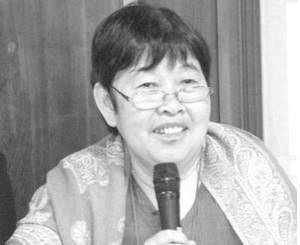30 Years of Devotion to Women's Studies
 |
| Du Fangqin [File Photo] |
Du Fangqin, women's studies professor at Tianjin Normal University, has been devoted to her chosen specialty ever since she entered the field in 1985.
In spring and summer of 1985, Du met Li Xiaojiang, her graduate coursemate, two times. Under Li's influence, Du began to focus on women's studies. Li is one of China's pioneers in studies on gender and women's issues. Around that time, Du also began to write her book Changes in Women's Views which was one of a series of publications on women's studies launched by Li. Released in 1988, it is one of the earliest books on women's issues in modern China.
Over the past three decades, she has been engaged in desk-based research and in the field, sticking firmly to her faith of "achieving women's empowerment through action; changing the status quo through knowledge; and, eventually moving forward with gender equality."
In 1991, she co-launched a two-week study program called Women's History in China and Abroad. Despite poor financial circumstances, its positive reception brought her an invitation from the Center for East Asian Research at Harvard University to attend a seminar concerning culture, nation and women.
For the very first time, Du got to know the concept of "gender" at the seminar in 1992 and was inspired to establish an institute for Chinese women's development in Tianjin.
In January the next year, the Center for Women's Studies at Tianjin Normal University came into being and attracted hundreds of researchers and activists to its seminar the same year.
During the event, new concepts and fields such as "gender," "women's empowerment," "women's development" and "reproductive health" were introduced to Chinese academia. Accordingly, the attendees carried out multiple discussions, paving the way for the later World Conference on Women which would take place in Beijing.
In 1994, Du conducted field studies in the rural area of north China's Hebei Province, to seek out the "roots" beneath social phenomena to do with gender, and explore the history involved. While providing a helping hand to rural women in the development, Du and her team acquired more grassroots knowledge and wisdom.
The 4th World Conference on Women in 1995 set her mind racing, with over 30,000 women from all over the world sharing and exchanging their ideas and thoughts. Similarly enlightened and encouraged by the event were hundreds of scholars around the country.
Seeing the massive influx of researchers entering the field of women's studies, coupled with frequent international exchanges, Du felt the need to promote and improve women's studies among universities in China. With the help of various social supporters, a six-year study program was launched in 1999, aiming to "develop women's and gender studies in China."
The program, which spanned 70 universities around 21 provinces, united many researchers and outstanding teachers on women's studies, provided hundreds of courses and produced nearly 30 textbooks. Some 1,000 people have benefited from the project and many of them are now active in higher education institutions around the country.
Since 2008, Du has been a member of the research and advocacy group for gender equality policies. Throughout the years of studies and practices, what impressed her most is the crucial role of rural communities in popularizing women's studies, relevant laws and education, as well as women's empowerment. She has witnessed the efforts by grassroots women's organizations in amending discriminatory community rules and changing undesirable customs. The progress of rural women has brought about changes to men and the villages, she noted.
As a scholar of women's studies, Du always makes it her responsibility to promote the subject among the public and make it truly useful to people. Then she wants to improve academic studies through public learning and participation—a virtuous circle that drives her to conduct field studies even in her 70s.
However, no one is omnipotent in the circle, and gender equality and social justice are only possible with interdisciplinary alliances and common actions, she said.
(Source: China Women's News/Translated and edited by Women of China)
Please understand that womenofchina.cn,a non-profit, information-communication website, cannot reach every writer before using articles and images. For copyright issues, please contact us by emailing: website@womenofchina.cn. The articles published and opinions expressed on this website represent the opinions of writers and are not necessarily shared by womenofchina.cn.


 京公网安备 11010102004314号
京公网安备 11010102004314号